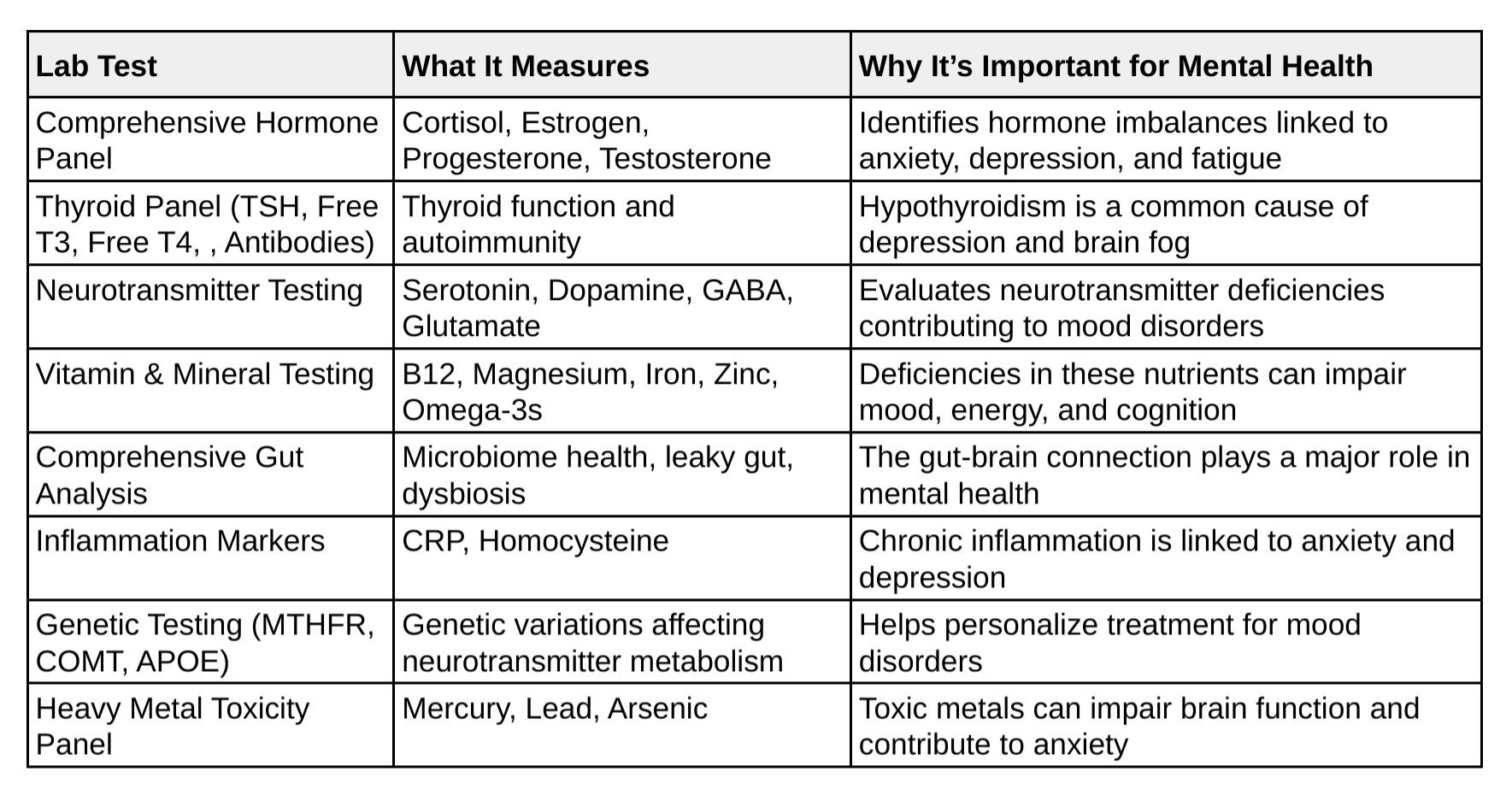The Role of Functional Lab Testing in Mental Health Treatment
Many people struggling with anxiety, depression, and mood disorders are prescribed medications without ever understanding the root cause of their symptoms. While medications can help, they often mask the symptoms rather than addressing the underlying imbalances.
Functional lab testing provides a holistic, science-based approach to mental health by identifying hormonal, nutritional, inflammatory, and gut-related imbalances that contribute to mood disorders.
Why Functional Lab Testing Matters in Mental Health
Traditional mental health care often overlooks biochemical factors that influence mood, including:
🔹 Nutrient deficiencies that impair brain function
🔹 Hormonal imbalances that contribute to anxiety and depression
🔹 Gut dysbiosis and inflammation affecting neurotransmitters
🔹 Toxic burden and heavy metal exposure
By testing for these hidden imbalances, functional medicine practitioners can create personalized treatment plans to improve mood, cognition, and emotional resilience.
Key Functional Lab Tests for Mental Health
Key Takeaway: Mental health isn’t just about brain chemistry—hormones, gut health, inflammation, and genetics all play a role.
1. Hormonal Testing: How Cortisol, Estrogen, and Thyroid Affect Mood
Cortisol and the Stress Response
🔹 Chronic high cortisol = anxiety, insomnia, irritability
🔹 Chronic low cortisol = fatigue, depression, brain fog
Thyroid Imbalances and Depression
🔹 Low thyroid hormones (Hypothyroidism) → depression, fatigue, low motivation
🔹 Autoimmune thyroid issues (Hashimoto’s) → brain fog, anxiety, mood swings
How to Fix It:
Adaptogens (Ashwagandha, Rhodiola) for stress resilience
Iodine & Selenium for thyroid function
Hormone-balancing diet with healthy fats and protein
2. Neurotransmitter Testing: Identifying Imbalances in Brain Chemistry
🔹 Low Serotonin = Depression, low mood, poor sleep
🔹 Low Dopamine = Lack of motivation, fatigue, brain fog
🔹 Low GABA = Anxiety, racing thoughts, panic attacks
How to Fix It:
5-HTP or tryptophan for serotonin production
Tyrosine-rich foods (eggs, fish, dairy) for dopamine support
Magnesium and L-theanine to boost GABA naturally
3. Gut Health Testing: The Gut-Brain Connection
🔹 Leaky gut and dysbiosis can lead to neuroinflammation and mood instability.
🔹 Gut bacteria produce neurotransmitters like serotonin and dopamine.
How to Fix It:
Probiotic-rich foods (yogurt, kimchi, kefir) to restore gut balance
Prebiotics (fiber, resistant starch) to feed beneficial bacteria
Limit processed foods, sugar, and alcohol to reduce gut inflammation
4. Vitamin & Mineral Testing: The Nutrients Your Brain Needs
🔹 Low B12 & Iron = Fatigue, brain fog, depression
🔹 Low Magnesium = Anxiety, sleep disturbances, irritability
🔹 Low Omega-3s = Increased inflammation, poor cognitive function
How to Fix It:
Increase nutrient-dense foods (leafy greens, nuts, seeds, fish)
Targeted supplementation if deficiencies are detected
5. Heavy Metal Testing: The Hidden Impact on Mental Health
🔹 Mercury, lead, and arsenic can disrupt brain function and contribute to mood disorders.
🔹 Toxic exposure from water, air, food, and dental fillings can accumulate over time.
How to Detox Naturally:
Chlorella & Cilantro for heavy metal binding
Infrared sauna therapy for detox support
Activated charcoal & bentonite clay to remove toxins
The Future of Personalized Mental Health Treatment
Functional lab testing allows for a deeper understanding of the biological factors influencing mental health. Instead of guessing, we can:
🔹 Identify imbalances early before they become bigger issues
🔹 Personalize treatment plans based on real data
🔹 Use natural, targeted interventions to correct deficiencies
At Brighter Balance, Dr. Holtski specializes in comprehensive lab testing and naturopathic treatment plans for individuals struggling with anxiety, depression, and mood disorders.
To learn more about Dr. Holtski’s background and approach to care, you can read more on the About Me Page.
When you’re ready to start on the path towards better health, you can book your first visit on our Scheduling Page.
FAQs
What is the most important lab test for anxiety and depression?
A comprehensive hormone, neurotransmitter, and gut health panel is the best way to get a full picture of mental health imbalances.
Can I order functional lab tests myself?
Some basic tests are available over the counter, but working with a naturopathic doctor ensures accurate interpretation and targeted treatment.
How long does it take to see results after addressing lab imbalances?
Many people feel better within 4-8 weeks of correcting deficiencies and imbalances.


